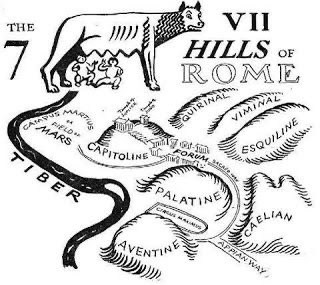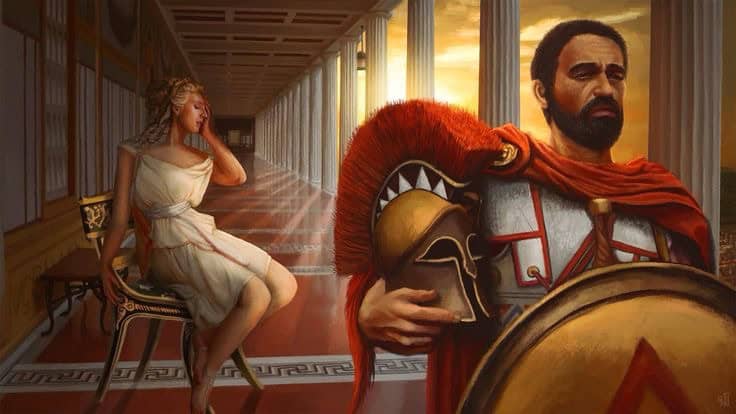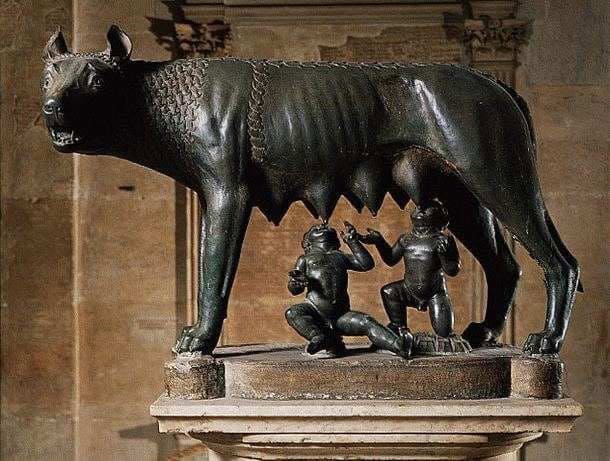Introduction

In the heart of the ancient world, where the Tiber River meets the seven hills, lies the tale of Rome—a city born from myth and forged into an empire that shaped the course of Western civilization.
Now, your history teacher probably told you that Rome was founded when Romulus and Remus–the twins who were raised by a she-wolf–argued over where to build their city, right?
Well, that’s true (as far as folklore goes).
But I’m here to delve deeper.
I’m a history aficionado, and I love telling people stories that give more context and depth to their knowledge of history.
What if I told you there’s a story even before Romulus and Remus? They didn’t exactly fall from the sky after all. They had their origins, and I’m about to share them with you.
Did you know that Rome had ancient ties with Troy? Yes, the city where Helen was taken to (or kidnapped) by Paris, the one with the famous Trojan horse.
That Troy.
The Full History of Rome awaits, let’s get started.
Trojan Origins
The story begins after the sack of Troy by the Greeks. Aeneas, son of Anchises–a cousin of King Priam of Troy–fled the city with a band of followers. Aeneas’ mother was Aphrodite, the Greek goddess of beauty and love, but for the sake of the Romans here, we’ll use her Latin name, Venus.
(greek names in brackets)
The hero wanted to rebuild Troy, but Juno(Hera), wife of Jupiter(Zeus), hated the city.
Why did Juno hate Troy?
You see, before the sack of Troy, there was a dispute in Olympus, the home of the gods. Juno (Hera), Venus (Aphrodite), and Minerva(Athena), had a dispute over who was the most beautiful. Some say the dispute started when Discordia (Eris), goddess of discord, discreetly threw a golden apple on the feast table of the gods.
On the apple was written: “for the most beautiful.”
A contest was held to decide. The goddesses felt that other gods might be too biased, so they decided to let a human be the judge.
The judge they picked was Paris, a prince of Troy, and each goddess sought Paris out secretly to try and bribe him.
Minerva offered him wisdom and victory.
Juno offered him wealth and power.
Venus offered him the most beautiful woman on earth.
Paris–the lecherous devil–went wild over the idea of having the most beautiful woman on earth all to himself, and picked Venus.
So Venus won, and helped Paris kidnap Helen, the most beautiful woman alive. I say kidnap, because Helen had a husband, and his name was Menelaus, King of Sparta.
The Sack of Troy and Aeneas’s Flight
In summary, an enraged Menelaus called up his brother Agamemnon and the rest of the Greeks, and well, you know the story. They sailed up to Troy, and after a long siege, gained access to the city by means of the Trojan horse, and sacked it. Paris himself died, and Juno finally sits down happily, right?
No. Juno wasn’t happy, because Aeneas wanted to rebuild Troy.
Aeneas journeyed from Troy in Anatolia (present day Türkiye) to Thrace (present day Bulgaria). There, he expected to be sheltered by a local king named Polymnestor, but he is betrayed. Polymnestor, once a Trojan ally, defected to the Greek side and killed Polydorus, a Trojan prince entrusted to him.
Aeneas fled and visited the oracle of Apollo at Delphi, where he was advised to set up a settlement on the western coast of Italy. He made a mistake and landed on Crete, but continued his journey when he was better informed.
Juno made her move and asked Aeolus, god of the wind, to blow Aeneas’ ship off course. Strong wind drafts carried them and beached their ship on the North African coast.
Aeneas and Dido
Aeneas met a group of Phonecian settlers led by their princess called Dido. He found out that they too were refugees on the run from Tyre, the Phonecian metropolis in present day Lebanon. The ruler of Tyre, Pygmalion, was Dido’s brother. He was a tyrant, and had killed Dido’s husband, so she fled to present day Tunisia to build a city there. That city would later become Carthage.
Venus, Aeneas’ mother, as a cautionary measure to prevent any harm from befalling her son, made Dido fall in love with him. Juno saw it as a means of getting Aeneas to stay in Africa for good, so she did nothing. Aeneas stayed for a while but later remembered his duty and set sail for the western shore of Italy, leaving Dido behind.

Dido, maddened by grief and betrayal, ordered for a pyre to be lit and for Aeneas’ belongings to be burnt in it. In her grief, she jumped into the burning pyre and died cursing Aeneas.
In Virgil’s Aeneid she’s reported to have said;
“Our arms, our seas, our shores, opposed to theirs;
And the same hate descend on all our heirs!”
And by so doing, Dido laid a curse of eternal enmity on Aeneas’s descendants. They would go on to fight The Punic Wars with notable battles like The Battle of Cannae
Aeneas in Italy
Meanwhile, the Trojan hero sailed through smooth seas to the western coast of Italy. They traveled up the River Tiber into the land of the Latins. Their King, Latinus, had no other heir but his daughter, Princess Lavinia. Noblemen had come from all over the land to seek her hand in marriage and claim the Latin throne, among which was the nobleman Turnus, Prince of the Rutuli. Latinus was sceptical though. He had been shown in a prophecy that his daughter would marry a foreigner of divine ancestry and their descendants would rule the world. So when Aeneas showed up, Latinus welcomed him warmly. He strongly believed that he was the man his daughter was supposed to marry, and gifted him and his people land, horses and chariots.
Juno, disgruntled by Aeneas’s bright future so far, sent for Alecto, one of the Furies. The Furies, also known as the Erinyes in Greek mythology, were goddesses of vengeance and retribution. They were typically depicted as three sisters:
Alecto (the unceasing)
Megaera (the jealous one)
Tisiphone (the avenger of murder)
Alecto took one of the snakes that she had as hair, and morphed it into a necklace that she put on the Latin queen’s neck. The queen became bitter at the thought of a foreigner marrying her daughter and she went into the city, uttering rousingly vile words about the Trojan visitors.
Aeneas Fights the Latins
Alecto also went to Turnus’s house and injected him with a burning hatred for Aeneas. He roused his men and instructed them to fight Aeneas’s people until the last drop of Trojan blood had stained the ground.
With the aid of the queen, Turnus secured the support of everyone in Latium, much to the dismay of the King Latinus. They decided to go to war with. The Trojans were outnumbered by the Latins, but they were veterans with expertise in the art of war. Their skills were tempered by a decade of fighting with the Greeks, and that made them excellent soldiers. Venus got her son Aeneas magical weapons and armour forged by her husband Vulcan under Mount Etna. On his shield were twins and a she wolf.
Aeneas rallied the Etruscans, Samnites and other Italian tribes and went to war against the Latins.
And won.
The Latins sent envoys to sue for peace and Aeneas obliged. Latinus suggested again that the Trojans be joined to the Latins by marriage, So Aeneas married Princess Lavinia and built a city which he named Lavinia in her honour. His son Ascanius went on to found Alba Longa, Rome’s predecessor city.
But that’s not where it ends, right?
It’s actually where it begins.
Stay with me.
The Story of Romulus and Remus
Alba Longa was ruled by Ascanius until his death, and his son Silvius ruled. After him was his son, Aeneas Silvius. Then came Latinus Silvius, and the Silvian dynasty ruled for many generations. By now the Trojans had intermarried with the Latins and had become one Latin people. Procas Silvius ruled and gave birth to two sons: Numitor and Amulius.
Numitor was the elder brother, and when Procas died, was to succeed. However Amulius overthrew him, sent him into exile, and killed all his sons. Numitor’s only daughter, Rhea Silvia was made a Vestal Virgin (priestess of Vesta, virgin goddess of Rome’s sacred hearth and its flame) by force, making her unable to have children on pain of death.
Rhea Silvia served as Vestal Virgin for a while, until she was seduced (or as some accounts say, raped) by Mars (Ares) the god of war. She gave birth to twins; Romulus and Remus. Amulius ordered that the twins be killed and had them enclosed in a basket and tossed into the River Tiber. They were found by a she wolf on the banks close to the capital line and the Palatine hills. In her cave she suckled the two babies and saved them from certain doom.

Romulus, Remus and the she-wolf were found by a shepherd named Pastor Faustulus. No, he wasn’t a pastor in today’s christian sense of the word. Actually the word “pastor” is of Latin etymology, meaning “shepherd.”
The Twins Come of Age
Romulus and Remus grew up and became strong young men. They hunted, practiced with their bows and spears, and boxed. People began to respect them because they stood up for the weak who were being oppressed in the region. One of their favorite hobbies was lying in wait for robbers to steal their plunder and share it among the local shepherds. They gathered a loyal band of young boys who would do anything for them.
One day, during a feast in honour of the god Pan, a band of robbers attacked Romulus and Remus’s followers. They kidnapped Remus and took him to Amulius, accusing him of raiding lands belonging to Numitor, who was in exile close to Alba Longa. Amulius sent Remus to Numitor to exact his punishment. By this time Pastor Faustulus, fearing for his son’s life, told Romulus the story of his birth. Numitor after questioning Remus, drew the same conclusion and set him free. Romulus gathered his men and headed towards Alba Longa to avenge his brother. He was joined by Remus who had gathered his own companions. They fought their way into the palace and there, Romulus killed Amulius. Numitor, thinking it was a foreign invasion, assembled his guards, but the twins soon appeared and eased his tension. They proclaimed Numitor the King of Alba Longa.
The Founding of Rome
Romulus and Remus would’ve expected to inherit the throne of their grandfather upon his death, but they couldn’t wait. They wanted their own city. The twins traveled up the River Tiber, looking for a suitable spot.
They came to a place where the River ran through seven hills. There, they had their disagreement.
Romulus wanted them to build their city on the Palatine hill, because it was really close to where they were found as babies.
Remus said that the Aventine hill was more favourable, stating that it was less steep and therefore would be easier to build upon. He argued that his choice was more logical than his brother’s, one that he said was borne out of sentimental attachments.
There was also a question of who would rule, which was a serious one as they were twins and neither knew who came out first. So they went to Numitor to ask him for help. Numitor recommend that they use a peculiar method to determine-augury.
Augury is the ancient practice of interpreting omens from the behavior of birds or other natural phenomena to predict future events or divine the will of the gods. It was particularly prominent in ancient Roman religion, where priests known as augurs would observe the flight, song, and feeding patterns of birds to make prophecies or guide decisions. This practice extended to interpreting other natural signs like thunder or the behavior of animals.
The Twins Fight
The brothers declared the advice a sound one and left to watch the birds. Romulus went to the Palatine hill to watch his birds while Remus went to the Aventine.
On the Aventine hill, Remus saw six vultures flying over his hill, and jubilantly ran to tell his brother. When he arrived, Romulus reported that he saw twelve vultures flying over the Palatine hill while Remus was on his way. Neither of them had discussed how the augury would be interpreted beforehand, so they fell into another argument.
Remus said, “The choice should be mine since I saw the birds first.”
Romulus said, “The city should be built on my hill because I saw TWELVE birds–a higher number–on MY own hill.”
Remus said, “efthisshit.”
A fight ensued, and Romulus killed Remus.
Romulus, The First King of Rome
After Romulus killed his brother Remus, he founded the city of Rome on April 21, 753 BCE on the Palatine Hill, where he had envisioned his city. He then appointed 100 senators, laying the groundwork for Rome’s political structure.
To populate his newly founded city, Romulus welcomed outcasts and fugitives, but he also needed women to ensure the city’s growth. Sending emissaries to neighbouring cities and towns, he asked for any women willing to join his city and partake in his enterprise, but nobody was willing. He and his companions then decided to take wives by force.
He famously orchestrated the “Rape of the Sabine Women,” by hosting games outside Rome and sending invitations to neighbouring tribes. The people of the Sabini tribe attended in particularly high numbers. When Romulus gave a signal, men rushed out and dragged women for themselves into the city gates. The outraged men massed outside Rome demanding that their daughters be released. Romulus refused, claiming that the women would be treated well and that they didn’t need to worry. He also said that it was unjust for their neighbours to deny them the right to marry and have children.
The Sabines and their allies gathered an army and attacked Rome, but were routed. Romulus wanted to chase and slay the townspeople, but his wife, at the Sabine women’s behest, begged him not to. Romulus agreed on the condition that they join the Roman state. They happily agreed, and many moved to Rome.
There were a few more disagreements, but the Romans and the Sabines eventually struck an alliance, with Rome as the regional hegemon.
Conclusion

Romulus ruled as Rome’s first king for about 37 years, enjoying a long period of peace. His death remains mysterious; one story pushed by the senate claims he was taken up to heaven during a storm in Campus Martius, leading to his deification as Quirinus, a deity in Roman mythology.
Some detractors whispered that he was killed and the senators made up the divine ascension story to keep the peace. This makes sense.
What’s undeniable is that from this mythological start, Rome grew from a city into an empire that would dominate the Mediterranean world for centuries, leaving a legacy that still echoes in our laws, language, and culture today.
So there you have it, the deep roots of Rome, from the ashes of Troy to the seven hills, with a dash of divine intervention, betrayal, and a whole lot of human drama. That’s the come up story of Rome, or at least, the legend that set the stage for one of the greatest civilizations the world has ever known.

